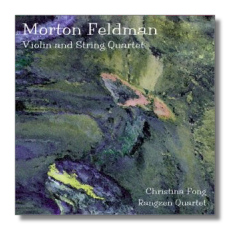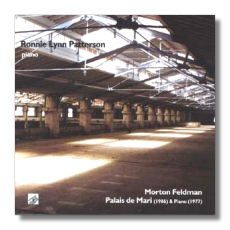
The Internet's Premier Classical Music Source
Related Links
- Feldman Reviews
- Latest Reviews
- More Reviews
-
By Composer
-
Collections
DVD & Blu-ray
Books
Concert Reviews
Articles/Interviews
Software
Audio
Search Amazon
Recommended Links
Site News
 CD Review
CD Review
Morton Feldman

Fields of Feldman
- Violin and String Quartet
Christina Fong, violin
The Rangzen Quartet
OgreOgress 643157069027 2CDs (cdbaby.com/all/ogreogress)


- Palais de Mari for piano
- Piano for piano
Ronnie Lynn Patterson, piano
L'empreinte digitale 13137 (Harmonia Mundi)
There must be something wrong with my brain. Whenever listening to music, it cannot multi-task; for example, reading Borges with Beethoven playing is beyond it. Either the book or the composition receives the short end of my attention span. Thankfully, Morton Feldman has changed that. His music is the perfect companion to "The garden of Forking Paths," or some other abstruse tale. At first, his "Violin and String Quartet" seems to consist only of two notes, played in lugubrious succession, over and over. Later on in this two hour piece, it becomes just one note. The soporific effect is undeniable, but there is more to this work than tickles the ear. First, it is ineffably eerie. "Why is he doing this?" you wonder. The ominous and subtle variations are unnerving as they enkindle vague senses of dread. But it is the dread of what might happen instead of what actually does. Nothing develops. It is impossible to shoehorn the music into an emotional landscape. It is too unassertive, too detached. It has neither program nor even one complex idea to convey. It exists in such a semi-meditative state; you can enter or exit at any point without feeling you've missed anything. But you may. The last ten minutes are indeed different than the first. Fong's violin gradually assumes more control over the quartet, leading it into imitation, sparking its tempo, and supplying high-pitched notes in dissonant tutti chords.
The two piano works on the l'empreinte digitale disc accomplish different goals, but still bear Feldman's mark. Again, the music is played adagio with very slight dynamic change. The unpredictable leaps from low to high register, the slow decay rate, the lack of melody, all demonstrate Feldman's boast that "as a piece gets longer, there has to be less material." Hearing this piece is like sipping Chinese Pu-Erh tea for the first time. The fermented flavor is a bit bizarre, but you get accustomed to it. Sometimes a note sounds seventeen times, interrupted by a gentle two-note chord. While nine years separate the two pieces, they differ in style, but only slightly. For example, there are leisurely arpeggios in Palais de Mari, rather than the apparent random notes of Piano. So calming are these pieces that they are ideal to make love to.
In one of Feldman's notable essays, he says his music should reside in a state of "extreme quietude," a "beauty without biography." Not only have I've never heard anything like it, but I'm surprised it's so appealing.
Copyright © 2002, Peter Bates




















